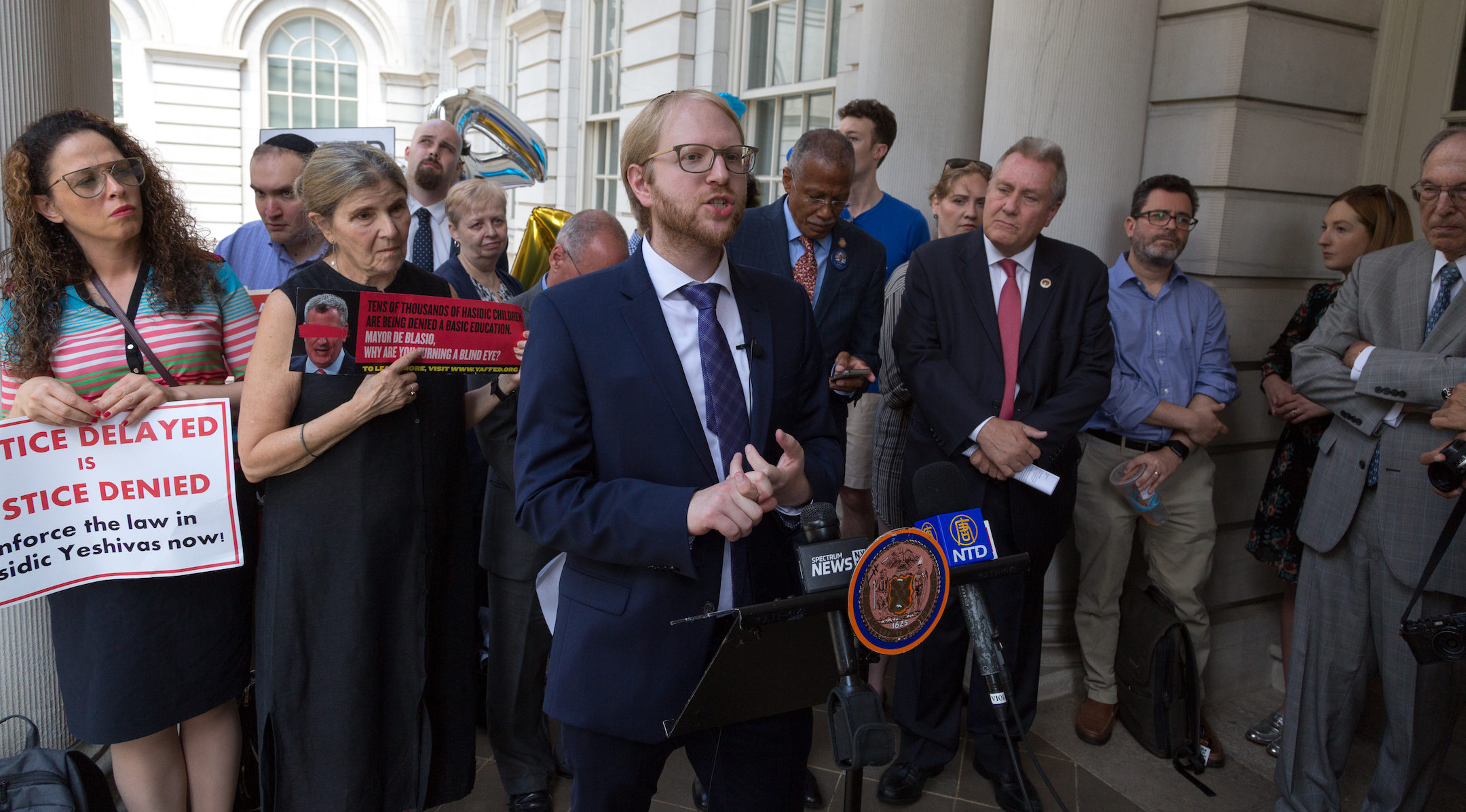(JTA) — Naftuli Moster, the founder and former executive director of Yaffed, the advocacy group focused on improving secular education in haredi Orthodox Jewish schools, is launching a news organization focused on what he sees as a news desert in the haredi world.
With a board that includes seasoned Jewish journalists, Shtetl: Haredi Free Press will launch online in 2023, and Moster said he is exploring a print option as well. Shtetl’s online announcement said it had seed funding for two years; Moster declined to comment on who the funders are but emphasized that the media organization would produce independent journalism.
“Every community needs a free press,” Moster told the Jewish Telegraphic Agency. “Members of this community, my community, deserve a free media as well. Shtetl’s existence is an exciting development in the Jewish and media spaces, and we are looking forward to making a big splash in early 2023.”
Moster, who grew up in a haredi Orthodox family in Borough Park, Brooklyn, stepped down from his position at Yaffed in September after a decade as its founder and leader. During that time, Yaffed got the attention of city and state education officials as the group filed multiple lawsuits meant to increase access to secular education in haredi yeshivas. In turn, he drew the ire of haredi Orthodox leaders, who resented an ostensible insider inviting scrutiny of their educational institutions.
The haredi communities of Brooklyn and New York’s exurban Rockland and Orange counties are currently served by successful print and online newspapers, in English and Yiddish, that tend to be protective of community interests, including the yeshivas.
Elad Nehorai, an ex-Hasidic writer and progressive activist, said these sites are more akin to community newsletters than journalistic enterprises, publishing local interest stories like death and wedding announcements, notices about community events and stories about construction of new synagogues or schools. National and world news coverage tends to focus on the haredi community in Israel and syndicated news copy about events outside of the religious world.
“The haredi world in general is not used to the kind of journalism that exists in the secular world,” Nehorai said. “In the secular world, investigating wrongdoing of leaders is a normal thing.”
For example, it was a secular newspaper — the Israeli daily Haaretz — that in 2021 reported on allegations surrounding Chaim Walder, a once-celebrated Israeli haredi children’s author, who was accused of having sexually assaulted more than 20 women, and several underage girls. Only after the allegations became a prominent topic of conversation in haredi communities did the press there begin to cover them — often with apparent sympathy to Walder.
“Very often if you look at the press there, it’s more about building community,” Nehorai said of the haredi world. By contrast, “If you open the New York Times it’s generally a lot of negative stories.”
Leaders of the haredi community were incensed when, in September, the New York Times published a major investigation that found that in New York’s Hasidic yeshivas, “generations of children have been systematically denied a basic education, trapping many of them in a cycle of joblessness and dependency.”Backlash from the Hasidic and other Orthodox communities began before the story was even published, with people claiming the New York Times and the Jewish reporters themselves were biased and even antisemitic in their reporting.
Moster envisions a role for Shtetl that will foster “important discussions that are crucial for the well-being of the Haredi community and beyond,” according to an online announcement. At the same time, “it will produce content that other outlets are unable, unequipped, or unwilling to provide to their readers, whether owing to the lack of resources, cultural competency, access to insiders or Yiddish language proficiency.”
The project is currently recruiting board members, full-time and freelance reporters, editors and marketing professionals. Its founding board includes journalists Larry Cohler-Esses of The Forward and Ari Goldman of Columbia Journalism School, neither of whom is haredi, as well as Adelle Goldenberg, a recent Harvard University graduate who grew up in the Hasidic neighborhood of Borough Park. Goldenberg was the winner of the 2021 Yaffed Changemaker Award for her assistance to haredi students who want to go to college outside of the yeshiva system.
Goldman, a former New York Times religion reporter who attends a Modern Orthodox synagogue, told JTA he became familiar with Moster’s work with Yaffed about five years ago. He said he was impressed by Moster’s efforts to get haredi young people a strong secular education and believed that haredi communities could benefit from improved journalism, as well.
“I want to be supportive of an effort that tries to shine more light on a community about which a lot is hidden and unknown,” Goldman said. “I’m also very interested in good journalism, which I think is a cornerstone of our society. And I want to see it put to the best of use in the haredi community.”
Critics of Shtetl, purporting to be from within the haredi and Orthodox world, have already voiced their opinions on social media, claiming that the new media endeavor has some sort of agenda to undermine their communities.
The backlash echoes the one that Moster has received for a decade already, when his education advocacy even earned him the label of “moser,” reflecting a dangerous accusation that he had inappropriately involved secular authorities in Jewish affairs.
“The people who are reacting negatively don’t see it as, ‘Oh they’re just writing negatively about us,’” Nehorai said. “They see it as traitorous. They see it as someone who’s turned on us. And what’s fascinating about that is that it doesn’t matter if you are haredi or you are ex-haredi, what occurs then is you are labeled as an outsider.”


